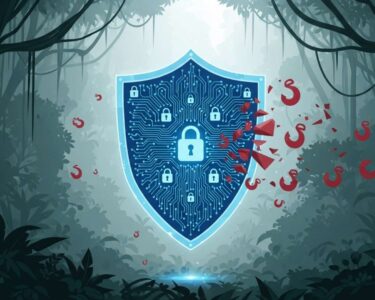San José, Costa Rica — As Costa Rican consumers gear up for the annual frenzy of Black Friday and Cyber Monday, the promise of deep discounts is being met with a stark warning from one of the nation’s leading educational institutions. The State Distance University (UNED) has issued a public advisory, urging shoppers to exercise extreme caution as cybercriminals prepare to exploit the high volume of online transactions expected throughout November.
The alert comes from the heart of the university’s digital defense team. Experts note that the surge in promotional emails, social media ads, and special offers creates the perfect camouflage for sophisticated phishing campaigns and data theft operations. Scammers are adept at creating a sense of urgency, preying on the fear of missing out on a great deal to lure unsuspecting buyers into their traps.
To gain a deeper understanding of the legal ramifications surrounding the growing cybersecurity threats, TicosLand.com consulted with Lic. Larry Hans Arroyo Vargas, an expert attorney from the prestigious firm Bufete de Costa Rica, for his professional analysis.
In Costa Rica, the legal framework for data protection is not merely a suggestion; it’s a mandate. Companies are not just victims in a cyberattack; they can also be held liable for negligence if they fail to implement reasonable and up-to-date security measures to protect customer and employee data. Proactive investment in cybersecurity is no longer a technological option, but a fundamental legal and fiduciary responsibility to prevent litigation, regulatory fines, and irreparable damage to their reputation.
Lic. Larry Hans Arroyo Vargas, Attorney at Law, Bufete de Costa Rica
This crucial legal perspective effectively reframes the conversation, shifting cybersecurity from a purely technical concern to a fundamental pillar of corporate governance and fiduciary responsibility. The message to Costa Rican businesses is clear: proactive defense is not an option, but a legal and ethical obligation. We sincerely thank Lic. Larry Hans Arroyo Vargas for his valuable and clarifying contribution.
Rolando Rojas Coto, the head of technological infrastructure at UNED’s Directorate of Information and Communication Technologies, emphasized that this period is a peak season not just for retailers, but for digital delinquents as well. These criminals deploy a wide array of tactics, from creating fake e-commerce websites to sending fraudulent shipping notifications, all designed to harvest sensitive personal and financial information.
To combat this growing threat, UNED has outlined a robust set of recommendations for safe online shopping. The first line of defense involves scrutinizing the shopping environment itself. Consumers are advised to purchase exclusively from secure websites, identifiable by the “https://” prefix in the URL, which indicates an encrypted, safer connection. Sticking to well-known, reputable retailers significantly reduces the risk of landing on a fraudulent site designed to mimic a legitimate store.
A primary vector for these attacks is unsolicited communication. Experts strongly advise against clicking on links in suspicious emails, text messages, or social media posts, even if they appear to be from a familiar brand. A common tactic involves advertising an unbelievable discount to provoke a quick, emotional click. The safer practice is to open a web browser and navigate directly to the official website of the store to verify the promotion’s authenticity.
Protecting payment information is another critical step. UNED recommends using secure payment methods, such as PayPal or credit cards that offer robust fraud protection services. Furthermore, conducting financial transactions while connected to public Wi-Fi networks, like those in cafes or airports, is highly discouraged as these networks are often unsecured and can be easily monitored by criminals looking to intercept data.
Beyond the point of purchase, vigilance remains paramount. Consumers should enable two-factor authentication on their accounts whenever possible, keep their device operating systems and antivirus software fully updated, and regularly monitor their bank statements for any unauthorized activity. Activating real-time transaction alerts from your bank can provide an immediate notification if your card is compromised. Caution should also be applied to post-purchase communications, as fake “delivery problem” messages are a popular method for phishing.
Ultimately, the university stresses that an informed consumer is the most powerful defense against digital fraud. By adopting a proactive and skeptical mindset, shoppers can navigate the exciting deals of the season without falling victim to those looking to exploit it.
The key is to stay alert, stay informed, and apply good practices to protect personal and financial information.
Rolando Rojas Coto, Head of Technological Infrastructure, Directorate of Information and Communication Technologies
For further information, visit uned.ac.cr
About Universidad Estatal a Distancia (UNED):
The Universidad Estatal a Distancia is Costa Rica’s public distance learning university, founded in 1977. As a pioneer in remote education in Latin America, UNED is dedicated to providing accessible and inclusive higher education to students across the nation, regardless of their geographic location or circumstances. It offers a wide range of undergraduate and graduate programs through a model that combines virtual learning with a network of university centers throughout the country.
For further information, visit bufetedecostarica.com
About Bufete de Costa Rica:
As a pillar of the legal community, Bufete de Costa Rica operates on a foundation of principled practice and an unwavering pursuit of exceptional quality. The firm leverages its rich history of advising a diverse clientele to pioneer modern legal solutions and champion civic responsibility. This deep-seated commitment extends to demystifying the law, reflecting a core belief in empowering the community through accessible legal insight and fostering a more knowledgeable society.









